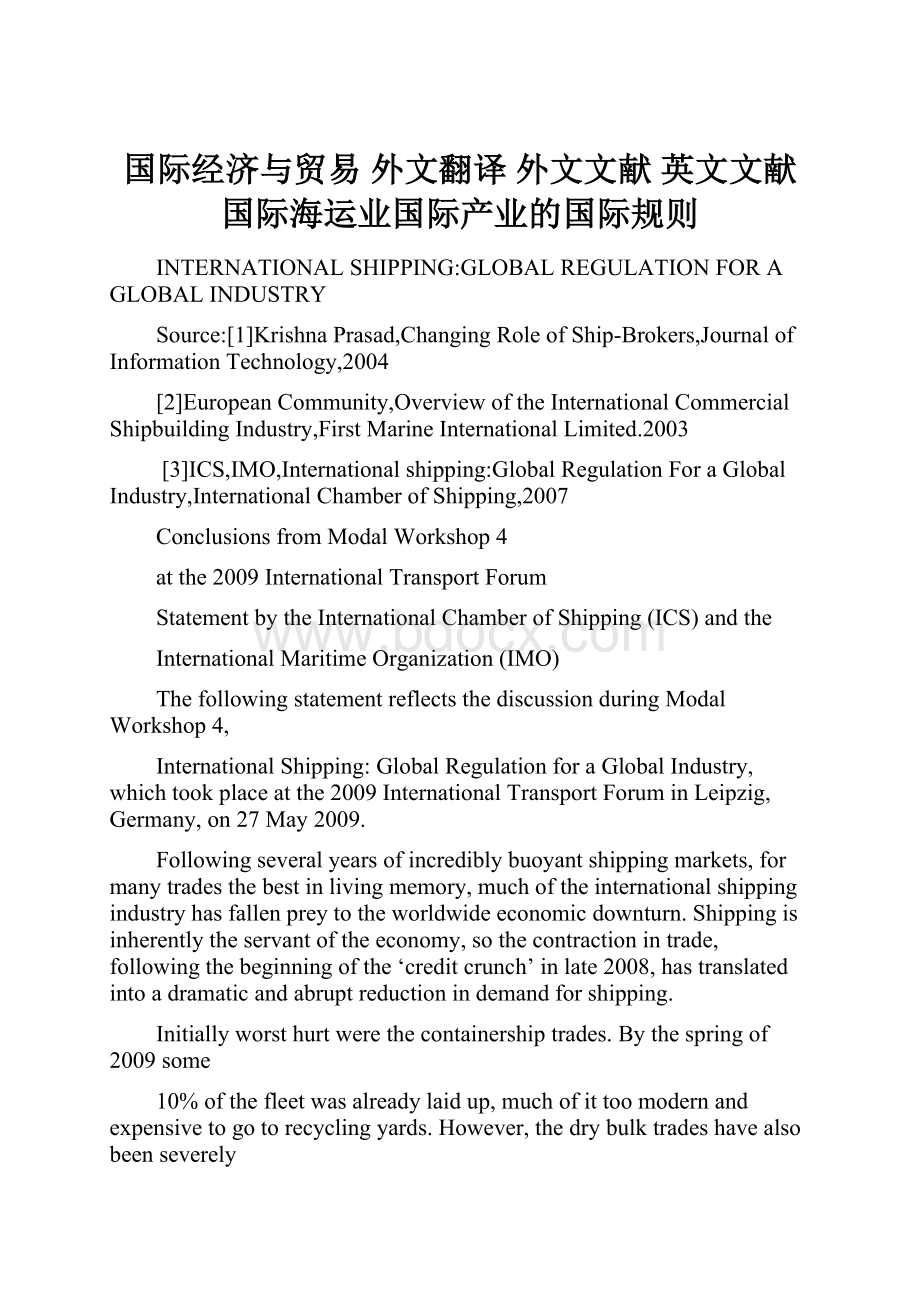国际经济与贸易 外文翻译 外文文献 英文文献 国际海运业国际产业的国际规则.docx
《国际经济与贸易 外文翻译 外文文献 英文文献 国际海运业国际产业的国际规则.docx》由会员分享,可在线阅读,更多相关《国际经济与贸易 外文翻译 外文文献 英文文献 国际海运业国际产业的国际规则.docx(18页珍藏版)》请在冰豆网上搜索。

国际经济与贸易外文翻译外文文献英文文献国际海运业国际产业的国际规则
INTERNATIONALSHIPPING:
GLOBALREGULATIONFORAGLOBALINDUSTRY
Source:
[1]KrishnaPrasad,ChangingRoleofShip-Brokers,JournalofInformationTechnology,2004
[2]EuropeanCommunity,OverviewoftheInternationalCommercialShipbuildingIndustry,FirstMarineInternationalLimited.2003
[3]ICS,IMO,Internationalshipping:
GlobalRegulationForaGlobalIndustry,InternationalChamberofShipping,2007
ConclusionsfromModalWorkshop4
atthe2009InternationalTransportForum
StatementbytheInternationalChamberofShipping(ICS)andthe
InternationalMaritimeOrganization(IMO)
ThefollowingstatementreflectsthediscussionduringModalWorkshop4,
InternationalShipping:
GlobalRegulationforaGlobalIndustry,whichtookplaceatthe2009InternationalTransportForuminLeipzig,Germany,on27May2009.
Followingseveralyearsofincrediblybuoyantshippingmarkets,formanytradesthebestinlivingmemory,muchoftheinternationalshippingindustryhasfallenpreytotheworldwideeconomicdownturn.Shippingisinherentlytheservantoftheeconomy,sothecontractionintrade,followingthebeginningofthe‘creditcrunch’inlate2008,hastranslatedintoadramaticandabruptreductionindemandforshipping.
Initiallyworsthurtwerethecontainershiptrades.Bythespringof2009some
10%ofthefleetwasalreadylaidup,muchofittoomodernandexpensivetogotorecyclingyards.However,thedrybulktradeshavealsobeenseverely
affected,particularlybythereductionindemandforrawmaterialsfromChina,
withspotmarketfreightratesforsomebulkcarriersbeingafractionofthepeakpricesachievedin2008.ByApril2009,ratesforcrude,productandchemicaltankershadalsofallenverysharply.Ingeneralmostshippingmarketspresentaratherbleakpicture.
AmajorconcernofICSnationalshipowners’associationsthereforeisto
discouragegovernmentsfromrespondingtothecrisiswithprotectionist
measures,whichwillonlydamageworldtradefurther.Moreparticularly,
governmentsmustavoidmeasuresthatrestrictfairandopenaccesstoshippingmarkets.Althoughmostshippingtodayenjoysrelativelyliberalisedtradingconditionscomparedtothedaysofnationalcargoreservationinthe1980s,shippingisunusualinthatitisoneofthefewmajorindustriesnotyetcoveredbyaglobalmultilateraltradeagreement.However,theprospectofanewagreementundertheauspicesoftheWorldTradeOrganization(WTO)looksincreasinglyuncertain.Theindustrymustthereforebeextremelyvigilantinreactingtoanymovestowardsprotectionisminmaritimetrades,especially
thoseusingsafetyandsecurityasapretext.
Theshippingindustrydoesnotexpectspecialtreatment,orthebillionsofdollarsofsupportbeinggrantedbysomegovernmentstothelikesofthebankingandautomobileindustries.However,tooperatecompetitivelyandefficientlyinverydifficultcircumstances,shippingrequiresthemaintenanceofaregulatory‘levelplayingfield’,andcontinuationofthecertaintynowprovidedbythetonnagetaxregimesthatapplytoshipownersinmanycountries.
Shippingisnotoriouslyvolatile,anditsmoreexperiencedpractitionersarefamiliarwiththecyclicalboomandbustnatureofmaritimefreightrates.However,thecontractionresultingfromthegeneralglobaldownturncouldwellbeexacerbatedbythelargenumberofnewbuildingsduetocomeintoserviceduringthenextfewyears,notwithstandingeffortsbymanyshipownerstocancelorrenegotiatecontracts.Manyoftheseshipswereorderedathighpricesatthetopofthemarket.
Inthefaceofthistwo-waypressure,thereislikelytobeaconsiderableincreaseinthenumberofoldervesselsthatwillbesentfordismantlingandrecycling.Inviewoftheadoption,inMay2009,ofanewIMOConventiontoaddressconcernsaboutworkingandenvironmentalconditionsinshiprecyclingyards,theneedforgovernmentstoidentifyfacilitiesthatareacceptableforusewillbecomeallthemorepressing.
AstheIMOSecretary-Generalhasforcefullyidentified,financialpressuresontheindustrymustnotbeallowedtoresultinanyreductioninstandards.Muchhasbeenachievedinthelast20yearswithregardtosafetyandenvironmentalperformance,andnooneissuggestingamoratoriumonnewregulationsthatgenuinelyimprovesafety,whichisalwaystheindustry’soverridingpriority.However,governmentsneedtounderstandthatanyimmediateregulatoryandpolicydecisionstheytakemustavoidimpactingnegativelyonshippingasitstrugglestodealwiththecurrenteconomicsituation.
Notwithstandingthecurrentgloomanddoom,thelongertermoutlookfortheindustryremainsverygood.Theworld’spopulationcontinuestoexpand,andemergingeconomieswillcontinuetoincreasetheirrequirementsforthegoodsandrawmaterialsthatshippingtransportssosafelyandefficiently.Inthelongerterm,providedthepoliticiansmakesensibledecisions,thefactthatshippingisthemostfuelefficientandcarbonfriendlyformofcommercialtransportshouldworkinfavourofanevengreaterproportionofworldtradebeingcarriedbysea.
ItistobehopedthatMinistersattheInternationalTransportForumwill
deliverastrongstatementinsupportofthemaintenanceofopenshipping
markets,and,moregenerally,promoteanearlyconclusionoftheWTO
negotiationsforanewglobaltradeagreement.
Chinahasseenorderintakerisesteadilyoverthepastfiveyears,achievingashareof13%by2002.Thishasbeeninlinewiththeplansofcentralgovernmenttodeveloptheindustry,withmajorinvestmentinrecentyears.However,intermsofmarketsharetheindustryisstillwellbehindthetwoleadersinJapanandSouthKorea.ChinesebuildersfocusinparticularontankersandbulkcarrierstogainvolumebutparticipateinmostmarketsectorsapartfromtheLNGmarket.ChinaexpectstoachievethecapabilitytobuildLNGcarriersinthenearfuture.ItisalsoonlyrecentlythatChinahasdevelopedthecapabilitytobuildlargetankers(aframaxandabove)andtheconstructionofagreatershareoftheVLCCmarketisanaimoftheindustry.Agreatershareofthecontainersector,inparticularthelargeshipsector,isalsoagoaloftheindustry.Todatecontainershipconstructionhasbeenrestrictedtosmallershipsonly.
TheEUindustryhasseenorderintakefallsignificantlyinrecentyears,inparticularduetoadownturnintheorderingofcruiseshipsandlossofshareofthecontainermarket.MarketshareintheEUindustryisnowdownto7%.EUshipyardshavelostalmostallshareofthebulkcarriersectorandmostofthetankersector.Containershipmarketshare,thelastvolumesectorinwhichEUyardshaveafoothold,hasalsofallenoverthepastfiveyears.Increasingreliancehasbeenplacedonthepassengerandspecialisedsectors,withshipyardstakinga54%shareofferryordersin2002andalmostallcruiseshiporders.Havingsaidthis,ordervolumeforpassengershipswasrelativelylowin2002andorderintakeintoEUshipyardswascorrespondinglylow.
IneffecttheindustryintheEUhashadtoretrenchintoasmallnumberofmarketnichesinrecenyears,predominantlysmallships,passengershipsandspecialisedships.Thecruisemarketmaintainedsomevolumeupto2001butwithasharpfallinorderintakeinthatsectortheindustryasawholehasseenorderintakeandmarketshareplummet.
Japanhasseenasteadyorderintakeinrecentyears,withthemarketleadalternatingwithSouthKoreaaccordingtoshiftsinmarketandeconomicconditions.Japanhadaverystrongmarketleadin2002.Japaneseshipbuilding’smainproductisbulkcarriersforthehomemarket,makingupalmost40%ofallorderstakenin2002.Oilandchemicaltankersandgascarriersalsomakeupasignificantportionoftheindustry’sbusiness.JapaneseshipbuildinghaslostaconsiderableshareofthecontainershipmarkettoSouthKorea.
SouthKoreaexperiencedasignificantpeakoforderintakein2000andarelativelysteadylevelinotheryears.SouthKoreanshipyardstookover50%ofthecontainershipmarketin2002,over40%oftheoiltankermarketandsignificantsharesofthegasandchemicaltankermarkets.Theindustryhastriedtoexitthebulkcarriersectorbecauseoflowvalue,althoughithasbeenforcedtotakeordersrecentlytomaintainproductionvolume.
SouthKoreanbuildershavebeentryingtopursueastrategytoaddressthehighervaluesectorstomaximiseprofitability,inparticularthemarketforLNGcarriers.ThescopetodothisislimitedinrelationtothevolumeofworkneededtokeeptheindustryinSouthKoreabusy.Theproductfocustablesincludedinappendix3tothisreportindicatethatwhilsttherewasasignificantintakeofLNGcarriersin2001,ordinarilythissectormakesuplessthan10%ofthetotalorderintakeintoSouthKorea.Koreanbuildershaveyettopenetratethepassengershipsectortoanysignificantdegree,thisbeingtheotherhighaddedvaluesectorthattheyardsmaytrytopursue.Inatypicalyearuptoaround80%oforderswillbefromthemainbulkcargosectors,tankers,bulkcarriersandcontainerships.
Shipbrokersareintermediariesbetweenthetwopartiestoacontract,whethertheyareShipownersandCharterersorbuyersandsellers.Theymayactforoneprincipalandoccasionallyasthesolebrokerbetweenthetwocontractingparties.Theywillbeinvolvedinmostaspectsofacontract,includingcirculationoftonnageandbusinesstopotentialclients,negotiatingthemaintermsofthefixtureorsale,finalisingthedetailsofthecontractandfollowingthecontractthroughtoitsconclusion.Withfewexceptions,virtuallyallsecond-handshippurchasesareconductedthroughaShipbroker.